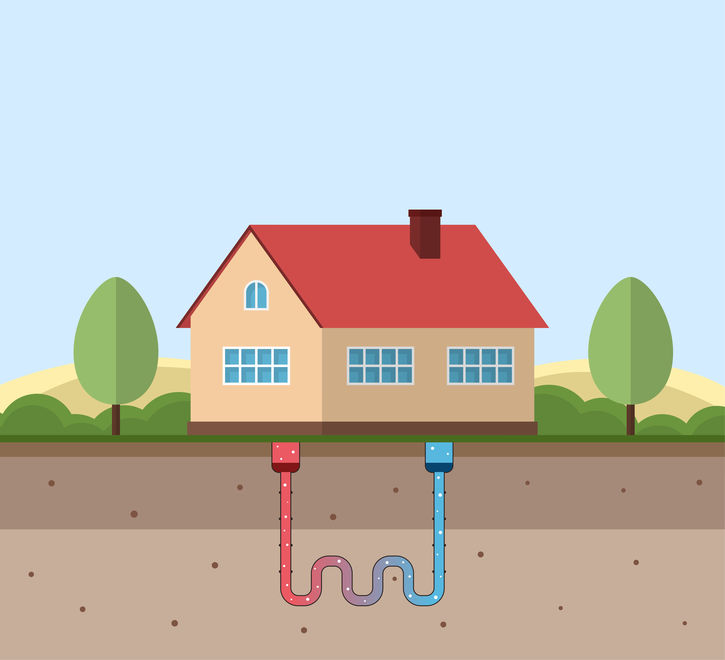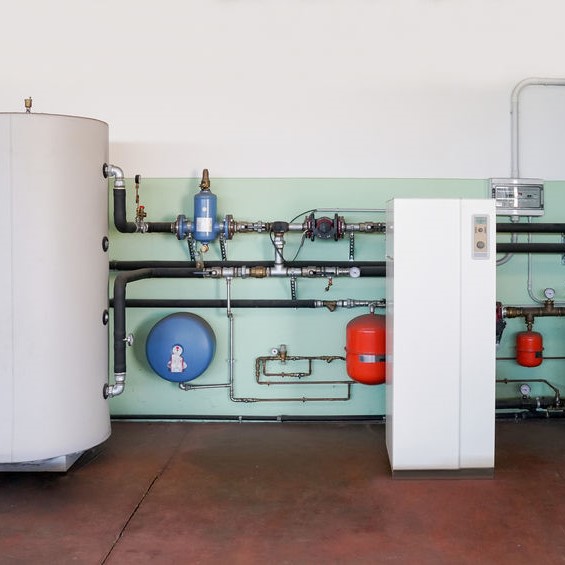
What is geothermal heating and cooling?
Today, we have a lot of choices for cooling and heating our homes. With everyone being budget conscious and more of us becoming environmentally conscious, we need to pay more attention to geothermal heating. If there is one constant in our lives today that we can actually count on, it is the source of geothermal heat. Yes, we’re talking about the internal temperature of the Earth.
Just thirty feet down, there is a source of energy that can supply our homes and businesses with cooling, heating, even hot water! For over fifty years, the technology to use this natural source of energy has been keeping people cool, warm, and supplied with hot water when needed. So, today, we’re going to go over geothermal heating and answer the questions that naturally come up when there is something different.
Geothermal heating and cooling systems, GSHP or Ground Source Heat Pumps, provides cooling and heating by swapping heat with Earth, where the temperature is ranges between 45o an 75o F, depending on the season. It is a heat source and a heat sink all in one.
How does geothermal heating and cooling work? Like any cooling and heating system, geothermal heating, or GSHP, has a few components, starting with an underground network of pipes interconnected used as heat exchangers. When the air cold during the winter, the ground is warm 30 feet below.
A refrigerant that has been injected into this network of pipes or coils absorbs the ground heat and transfers it into a structure. During the summer, the process is reversed and transfers the heat from the structure back into the ground.
How reliable is geothermal heating?
Geothermal heating is an excellent reliable source! With few moving parts in a GSHP system, the maintenance requirements are minimal when compared to the traditional HVAC cooling and heating equipment. There are fewer breakdowns and the applications for a geothermal heating and cooling system is extremely flexible, good for the smallest home to the biggest commercial structure.
What are the pros and cons of geothermal heating?
As with anything, there are pros and cons to geothermal heating and cooling. You should review those things, both sides of this equation, and determine what is best for your home, your budget, and your future.
Geothermal heating disadvantages
- Higher installation cost: This isn’t a new way to cool and heat, but it isn’t as well established and known as the traditional HVAC system. So, installation cost are still at a premium level which can be a setback for most. Yet, with the high efficiency it offers, your ROI will be paid in full within 5 to 10 years.
- Suitable for new builds: Geothermal installation is great for any home, but easiest for a new build due to the excavation needed to install for an existing home.
- Repairs to underground components can be costly: Along with an earth full of sustainable heat for the geothermal heating systems, there are also other factors of nature: ground shifting, rodents, and tree roots. These can all cause damage to the underground loops of a geothermal heating system. The repairs can be expensive if excavation is needed. Much like the sewer pipe coming from your home, which has improved over the years and so will repair of geothermal heating!
- Few experienced and knowledgeable installers: Not all HVAC companies have expanded into the geothermal energy industry yet. It may take some searching to find a company, and they may not be right around the corner from you.
Geothermal heating advantages
- Highly efficient: Because geothermal energy moves heat so the heating system in your home won’t have to create it. This enables it to operate up to 500 percent more efficiency. For every unit of electricity that a geothermal heat pump uses, it moves up to five units in heating. This can save the average homeowner as much as 60 percent for heating and as much as 50 percent in cooling when compared to the air conditioners and furnaces today.
- Minimal environmental impact: Geothermal heating is considered on of the greenest ways to heat homes and businesses today. It is virtually emission-free and doesn’t require combustion. Electricity is still needed to operate geothermal heat pumps, but pair with solar panels and you’ve got a win-win.
- Renewable source for heating and cooling: Geothermal heating and cooling takes an energy that is extract from the earth, where the temperature is more consistent all year long.
- Weather independent: Solar and wind power energy requires the sun and the wind. Geothermal heating and cooling doesn’t. If there is earth, there is a renewable energy source.
- Low maintenance and reliability: The pumps needed for geothermal heating and cooling doesn’t have many moving parts. This minimizes breakdowns and maintenance costs.
- Flexible: Geothermal heating and cool is workable for a small house or a large commercial structure.
- Operates quietly: Since the large components of a geothermal heating and cooling system are installed underground, it has a quieter operation.
Is geothermal better than natural gas?
A natural gas furnace uses natural gas and geothermal heating uses electricity. Natural gas prices are lower in part of the country, making it less expensive to operate a natural gas furnace than relying on electricity. Geothermal heating is often better than gas furnace heating, meaning the geothermal heating is more efficient overall.
 How warm does geothermal heating get?
How warm does geothermal heating get?
In 2009, it is reported by the U.S. DOE that over half of the GSHPs were shipped to 10 states from as far south as Florida and Texas, and as far north as Minnesota and New York. Why? Because Geothermal heating works any climate because it pulls from the constant temperature of the earth. There are businesses and homes using geothermal heating in all 50 states today.
Year-round, temperatures no more than 10 feet underground stay at 55 degrees Fahrenheit on the average. Does this mean your home will stay at 55 degrees too? No, the system will convert the geothermal heat and keep your home toasty warm no matter how cold it is outside.
Is geothermal heating and cooling worth it?
If you are in the market or cooling and heating your home, geothermal heating is the less traditional way, but it is one to give serious consideration. Not only will you save money each month, gaining back the expense of the installation, but you’ll be reducing your carbon footprint too. Interested in geothermal heating in Macon, GA? Call 478-781-9107 today.




